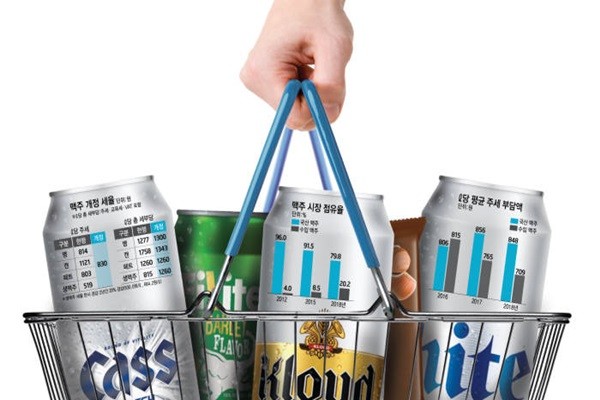How taxes are levied on beers and unrefined rice wines will be changed starting from 2020. It will change from an ad valorem tariff that levies taxes proportional to price to specific commercial tariff that levies taxes proportional to volume. This decision is preferred by both beer and soju businesses. As a result, South Korean Government and liquor industry expect that competitiveness of prices of South Korean liquors will improve.
South Korean Government and Democratic Party of Korea held a special consultative meeting on the 5th and decided on this change. They expect that their decision will resolve discrimination in liquor industry due to a gap between taxes on domestic and imported beers.
Beer industry especially is welcoming this decision. “We are overly excited about the fact that taxes on beers will be based on specific commercial tariff method that we have been looking forward to for many years.” said Korea Craft Brewers Association. “We are going to put in efforts to create fair competitions in order to provide beers with higher quality at a lower price.”
“It was more profitable to imported beers as an ad valorem tariff method had us pay more taxes as we produce more beers domestically.” said Oriental Brewery (OB), which is the top beer business in South Korea. “Because there is a high chance that we will bring back productions that are currently in overseas, we expect that we will be able to vitalize domestic market and create more jobs for the public.”
One liter of beer will be applied with $0.70 (830.3 KRW) in liquor tax starting from 2020. Domestic beers in cans will see 23.6% reduction in liquor tax, 30% of liquor tax, and value added tax. On the other hand, domestic beers in glass and domestic beers in plastic bottles will see an increase of 1.8% and 3.1% respectively.
While domestic beers based store price that includes manufacturing cost, sales management cost, and profit as standard for assessment and had taxes that correspond to 112.96% of this standard levied on them, imported beers only based declared value as standard for assessment.
As a result, there is less tax levied on imported beers and it only costs $8.46(10,000 KRW) for four cans of 500ml beer. Due to imported beer businesses dominating domestic market through supplies and competitive price, market shares of domestic beer businesses have continued to fall. This is the reason why there is discriminatory issue within beer industry.
Although consumers’ poor perception towards domestic beers that started with a foreign reporter saying that domestic beer’s taste is worse than North Korean beer is also one of the reasons for reduction of market shares, fact that imported beers’ competitive price is the main reason for higher market shares cannot be denied.
As a result, this change has prepared foundation that will improve competitiveness of South Korea’s liquor industry. Through this change, entire tax of a can beer can be reduced by about $0.34 (400 KRW).

It is unfair to levy taxes based on price as container is largely responsible of manufacturing cost of a can beer. However, when taxes are levied based on quantity of alcohol, alcohol price can be dropped greatly. Price of a 500ml can beer that is sold by a convenience store is between $2.37 and $2.41 (2,800 KRW and 2,850 KRW). When manufacturing cost and distribution margin are assumed identical, price of that same 500ml can beer can drop to about $2.11 (2,500 KRW). As a result, it will be possible to sell four domestic can beers at $8.46 (10,000 KRW) just like imported can beers.
Soju industry is relieved that it is not part of this change. Because taxes on soju would have jumped high when specific commercial tariff method is applied to soju, there would have been strong opposition from soju businesses and consumers.
Soju industry emphasized this issue during a public hearing that was held at aT Center on the 3rd and strongly opposed specific commercial tariff method to soju industry.
“If specific commercial tariff method is applied to entire liquor industry, structure of liquor industry that has continued for 50 years can change at once.” said President Lee Jong-soo of Muhak during this public hearing. “There needs to be more research done on influence of specific commercial tariff on soju industry before it is applied.”
Whiskey industry is also relieved. However, it wanted to somewhat relieve financial burden from taxes as it is levied with high taxes on its products.
“Although we are relieved that we are not part of this change, we somewhat expected to relieve some financial burden from taxes.”
Unrefined rice wine industry is not entirely happy with this decision. Unlike beer industry that has seen discrimination between domestic and imported beers, unrefined rice wine industry has relatively low burden from taxes as it is only levied with taxes that are 5% of store price.
Unrefined rice wine industry has emphasized ease of regulation rather than changes in tax rate. It wants South Korean Government to expand availability of ‘unrefined rice wine’ through revision of Liquor Tax Act. This is because when scent or color is added to unrefined rice wine, it is categorized as ‘others’ based on Liquor Tax Act and is applied with 30% tax rate rather than tax rate for unrefined rice wine.
“It is good to see that there is gradual change to laws on liquor tax that have been the same for many years.” said a representative for unrefined rice wine industry. “We hope that South Korean Government will go through more research and thinking and apply this change to other liquors as well.”
Staff Reporter Lee, Joohyun | jhjh13@etnews.com